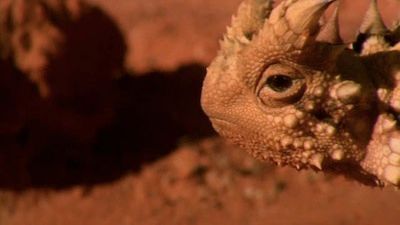Wild Down Under
Desert Heart (1x2)
:
The second programme examines the deserts of Australia's interior. These harsh environments make up two thirds of the land area. Vast areas support nothing but tough spinifex grass, indigestible to most herbivores. Instead, termites are the grazers of these grasslands. Inside the termite mound, a whole ecosystem flourishes; centipedes eat the termites and knob-tailed geckos prey on both. Lizards are one of the most successful animals in Australia's deserts, and a thorny devil is shown waiting alongside a pathway of ants. Mammals here are nocturnal, staying underground during the heat of the day. Those featured include bilbies and malas. Waterholes attract huge numbers of birds, and zebra finches are shown being preyed on by a falcon. Nearby, black-footed rock wallabies hop around on the precipitous rock faces. The Finke River is an important water source in central Australia and red-tailed black cockatoos gather here in large flocks to breed. Camels were originally brought over for transport, but now half a million roam the desert. Meat ants and aggressive bulldog ants are shown hunting and scavenging on the desert floor. The Simpson Desert has the largest expanse of parallel sand dunes in the world, but red kangaroos survive even here. Once thought to be an inland sea, Lake Eyre is normally an inhospitable salt pan. Every 30 years or so, exceptional rains charge rivers which flow inland, filling the lake. The waters trigger a rush to breed, attracting birds such as pelicans in their thousands.
